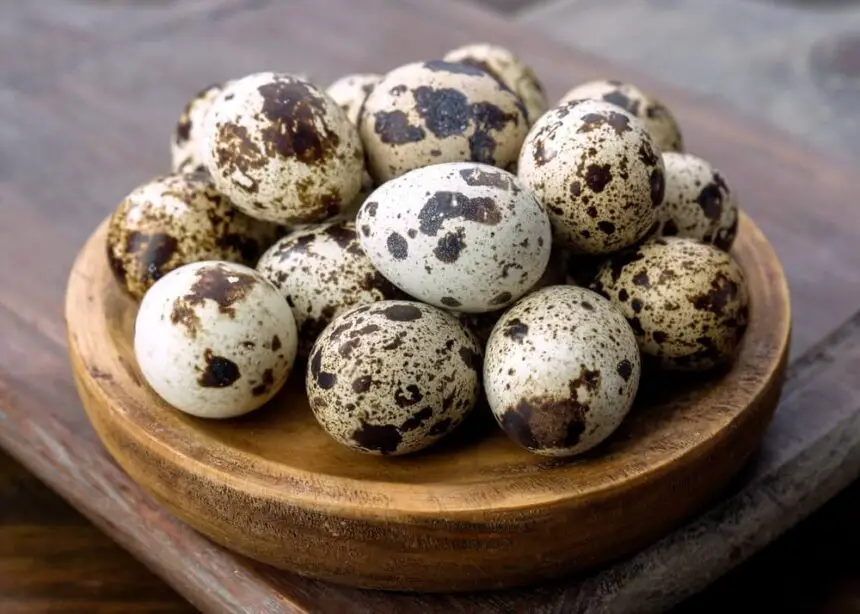You know what’s the purrfect breakfast for us humans? Eggs! We scramble them, fry them, and sometimes even poach them. But have you ever wondered if our feline friends could enjoy a little eggy goodness too? In this fur-tastic blog post, we’ll paw-sitively explore the question that’s been tickling the whiskers of cat parents all over the world – “Can Cats Eat Quail Eggs?” Grab a catnip toy and let’s dive right in!
Quail Eggs – The Petite Powerhouses!
Picture this: tiny eggs, smaller than your regular chicken eggs, packed with a whole bunch of nutrients! Quail eggs may be small, but they’re mighty when it comes to nutrition. Bursting with protein, vitamins, and minerals, these dainty delights are not only wholesome but also a gourmet treat for hooman beings.
But, hey, can our purr-friends safely nibble on these miniature ovums too?
Can Cats Eat Quail Eggs?
Well, well, well, folks, it’s time to reveal the catnip-scented truth! Yes, your cats can indeed relish quail eggs without whisker-twitching worry!
Let’s break it down for you:
1. Pawsitively Nutritious
Quail eggs pack a paw-some punch in terms of nutrition! These little treasures are protein-rich and carry essential amino acids that can be beneficial for your cat’s overall health. Plus, they’re like a vitamin storehouse – vitamin B, selenium, riboflavin, you name it! But remember, moderation is key – a treat here and there won’t hurt your furball.
2. Feather-Light Allergen Potential
Cats can be quite finicky when it comes to food allergies. The good news is that quail eggs have a low allergen potential compared to common allergens found in cat food. So, if your fur baby has some food sensitivities, these petite eggs might be a safer option to include in their diet.
3. Omega-3 Fatty Acids
Quail eggs are abundant in omega-3 fatty acids, which can contribute to a glossy and soft coat for your feline companion. Say goodbye to furballs – and hello to silky-smooth cuddle sessions!
4. Watch the Portion Paw-lice
Hold on, hooman! Before you scramble to feed quail eggs to your whiskered friend, remember that these eggs should be offered as an occasional treat. A few times a week is purr-fectly fine. Overindulging can lead to an upset tummy, and no one wants that!
Crackin’ the Quail Egg – Tips and Tricks
So, you’re ready to introduce these feathered gems to your cat’s menu, huh? Here are some quick tips to ensure your feline enjoys them to the fullest:
1. Serve ’em Fresh
Always serve fresh quail eggs to your cat. Just like milk, these eggs can go bad if left out too long, and nobody wants a stinky egg fiasco!
2. Cooked or Raw?
The million-dollar question! Cats are obligate carnivores, and they might prefer raw eggs over cooked ones. However, there’s a teeny-tiny risk of bacterial contamination from raw eggs. If you choose to serve them raw, ensure they’re sourced from a reliable and safe source.
Cooking the eggs removes the risk of bacterial infection, making it a safer option. Hard-boiled, scrambled, sunny-side-up – the choice is yours and your cat’s!
3. Shells – To Crush or Not to Crush?
Quail eggshells are a rich source of calcium, which is fantastic for your kitty’s bones and teeth. If you’re brave enough to give your furball the whole egg, make sure to crush the eggshells into tiny pieces to avoid choking hazards.
Alternatively, you can grind the shells into a fine powder and sprinkle it over your cat’s food for an easy calcium boost. Purr-fect!
When NOT to Share Quail Eggs with Your Cat
Wait, before you scamper off to the nearest quail farm, let’s address a few situations where you should give these eggs a pass:
1. Allergic Reactions
Even though quail eggs have a lower allergen potential, it’s still possible for some cats to have adverse reactions. Keep an eye out for any unusual symptoms and, if you’re unsure, consult your feline-friendly veterinarian.
2. Health Conditions
If your cat has any pre-existing health conditions, it’s crucial to consult with your vet before introducing new foods into their diet. Better safe than sorry!
3. Special Dietary Needs
Cats with specific dietary requirements, such as those on a prescribed diet, might need to stay away from new treats, including quail eggs. Your vet knows best, so check with them first!
In Conclusion: Catnip for Your Cat!
And there you have it, fellow cat aficionados! Quail eggs can indeed be a delightful and nutritious treat for your meowing munchkins. From their wholesome nutrition to the potential benefits for their fur and coat, these tiny ovums might just become your cat’s new favorite snack!
Just remember, moderation and mindfulness are the keys to keeping your furball’s tummy happy and healthy. So, treat your feline buddy occasionally to some quail egg goodness, and watch them purr in delight!
Paws up for happy and healthy cats! Until next time, keep spreading the love and joy to all your furry companions!
Meowtal Note: Before making any changes to your cat’s diet, it’s always best to consult with your veterinarian. Each cat is unique, and they might have individual dietary requirements or health conditions that need to be taken into account. Stay pawsitive and informed!


